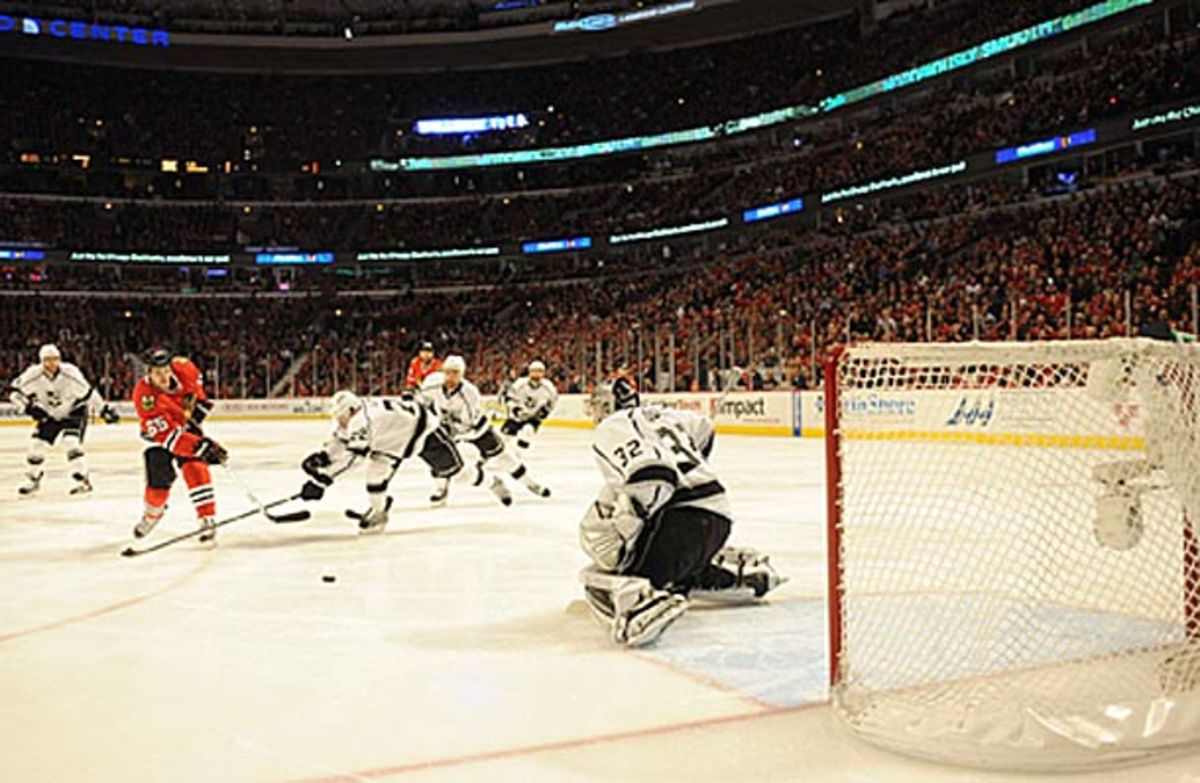NHL playoffs: More offense crucial for Kings in Game 5 vs. Blackhawks
Relying too heavily on goalie Jonathan Quick is proving to be the Kings' Achilles heel. (David E. Klutho/SI)
By Sarah Kwak
After coasting through last year’s postseason with nary a nick on them, the Los Angeles Kings are now staring at the edge of a cliff for the second time this spring. They made it through a Game 7 against San Jose, but now, down 3-1 to Chicago, the Kings have no room for error during the rest of the series. They’ll need three-straight wins just for the chance to defend their Stanley Cup title, long odds for a team that looks worn and weary.
First, there were the bruising six games against St. Louis that would only serve as a prelude to the hard-fought seven-game series against San Jose, which seems to have taken its toll on Los Angeles. Against Chicago, the Kings have not looked at all like the team that made its impressive run through the Western Conference last year. Only Jonathan Quick, their Conn Smythe-winning goalie of 2012, has been as sharp. And therein lies the issue.
Perhaps Quick is, in essence, too good and has allowed his team to over-rely on his goaltending to bail it out. It’s a risk clubs can run when the line between confidence in and reliance on the goalie becomes blurred. Take the Rangers, who have depended on Henrik Lundqvist like a crutch for years. The inability to score and generate enough offense has long been New York’s downfall, and now, the Kings seem to be in a very similar position.
GAME 4: Muir's take | Recap | Boxscore| Highlights | Complete postseason schedule
Look at the teams that have won the Cup during the last 10 years. With the exception of Martin Brodeur in 2003 and J-S Giguere in 2007, the winning team has had at least some reason to -- for lack of a better word -- doubt its own netminder. Yes, Tim Thomas was excellent for the Bruins. He won the Vezina in 2011 and led Boston to the Cup, but just a year before, he wasn’t even their regular starter. Chicago won with a rookie, Antti Niemi, in net; and so did Carolina, when Cam Ward announced himself in 2006. Detroit's Chris Osgood never got the respect he probably deserved in 2008.
Where there isn’t near-total reliance on the netminder, there is usually a greater impetus to score.
Indeed, as a relative unknown, Quick was exquisite in Los Angeles’s run to the Cup last year, but the Kings were generating much more offense than they have thus far this year. In 2012, Los Angeles had averaged 30.6 shots per game, and in fact, up until the Final, where they faced the always defensively minded Devils, the Kings were averaging 32.9 shots per game. Through this postseason’s first three rounds, however, Los Angeles is averaging a league-low 24.9, essentially eight fewer shots per game. What’s more, they have generated the fewest power play shots of any team this spring, and are successful with the man advantage just 16 percent of the time.
Kings defenseman Drew Doughty admitted to some Quick dependence, telling reporters after Thursday’s 3-2 loss, “We’ve been giving up too many goals. We’ve been relying on Quick to make too many big saves, and we’re not playing the right way.”
Asked if two goals per game, which is what L.A. has averaged this postseason, was enough, Doughty said, “If we’re only getting two goals, we can easily win… games with Quickie back there and our defensive team.”
But two goals per game is not enough to win the Stanley Cup. It’s not even enough for the Kings. In games this postseason where they have scored two or fewer, they are 4-8. When they’ve score more than two, they are 5-0. And historically speaking, two has never been enough. Since the 2004-05 lockout, each Cup winner has averaged at least 2.76 goals per game en route to the championship; the average among them was 3.13 and Vancouver had the lowest goals-for average of a finalist, with 2.32 in 2011.
So if the Kings expect to make it past the Blackhawks, they will have to create far more offense, throw more shots on net and look to score, not look back at Quick for help. They’ll need more than two goals, especially in Chicago, where the Blackhawks have been excellent this postseason while outscoring their opponents, 29-14. They’re 8-1 at the United Center this spring, and their power play, which has been a pathetic 1-for-22 on the road, is far better at home (22.2%).

































